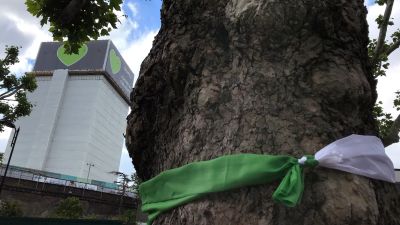Grenfell Tower revamp firms ‘little more than crooks and killers’, inquiry hears

The manufacturers of Grenfell Tower’s cladding system have been accused of being “little more than crooks and killers” who promoted construction materials despite knowing they “would burn with lethal speed”, the inquiry into the disaster has heard.
Lawyers for a group of bereaved, survivors and residents told the public inquiry that companies “assiduously and cynically” manufactured or provided products which they knew or suspected to be dangerous in pursuit of profit.
Module two, the latest stage in the inquiry, will scrutinise the production, testing and sale of the materials used in the tower’s revamp which resulted in the June 2017 fire, killing 72 people.
Addressing inquiry chairman Sir Martin Moore-Bick, Sam Stein QC told the inquiry on Monday: “In hearing the evidence within module two, sir, you and the panel may well come to the conclusion that the manufacturers, Arconic, Kingspan, and Celotex, are little more than crooks and killers.
“These companies knew their materials were dangerous to life, they knew their materials would burn with lethal speed.
“And yet they marketed their products into an uncaring and under-regulated building industry, which spread them around residential buildings like a disease.”
In written submissions to the inquiry on Monday, Mr Stein along with Adrian Williamson QC added: “The companies, in pursuit of commercial gain, manufactured and/or supplied products which they knew or suspected to be dangerous for use above 18 metres.
“They promoted them assiduously and cynically. And they manipulated those who had the crucial roles of testing and certification to ensure their products remained on the market.”
The lawyers said the public should have been protected “from those ruthless and criminal manufacturers” by testing and certification organisations including the Building Research Establishment (BRE) and the British Board of Agrement (BBA).
But, their written submissions add: “In fact, the testing and certification bodies provided no such protection but reinforced the dangerous and dishonest culture within the industry.
“The bodies were far too close to those whom they were supposed to be overseeing and far too willing to accept their misleading claims.”
Arconic made the thermoplastic-filled aluminium composite material (ACM) panels used on Grenfell Tower, which fuelled the fire’s spread, while Celotex produced most of the combustible foam insulation used on the tower, while a smaller amount of Kingspan insulation was also used.
The firms dispute claims against them.
For Arconic, Stephen Hockman QC previously told the inquiry: “The product was capable of being used safely, even for high-rise residential applications, if the appropriate cladding system was designed.”
Lawyers for Celotex have said Arconic misled the market about the fire safety of its cladding panels, and that the architects and fire consultants on the Grenfell project failed to carry out investigations into the fire performance of the materials used.
Celotex also said the combustible nature of its own Rs5000 insulation product was “clearly highlighted” in its marketing literature and “was or should have been known to construction professionals” considering it for use.
Kingspan has also said the plastic-filled ACM panels were responsible for the spread of the fire regardless of the type of insulation used.
It has added that none of its marketing literature suggested its K15 product was non-combustible or safe to use with ACM panels.
The inquiry continues.